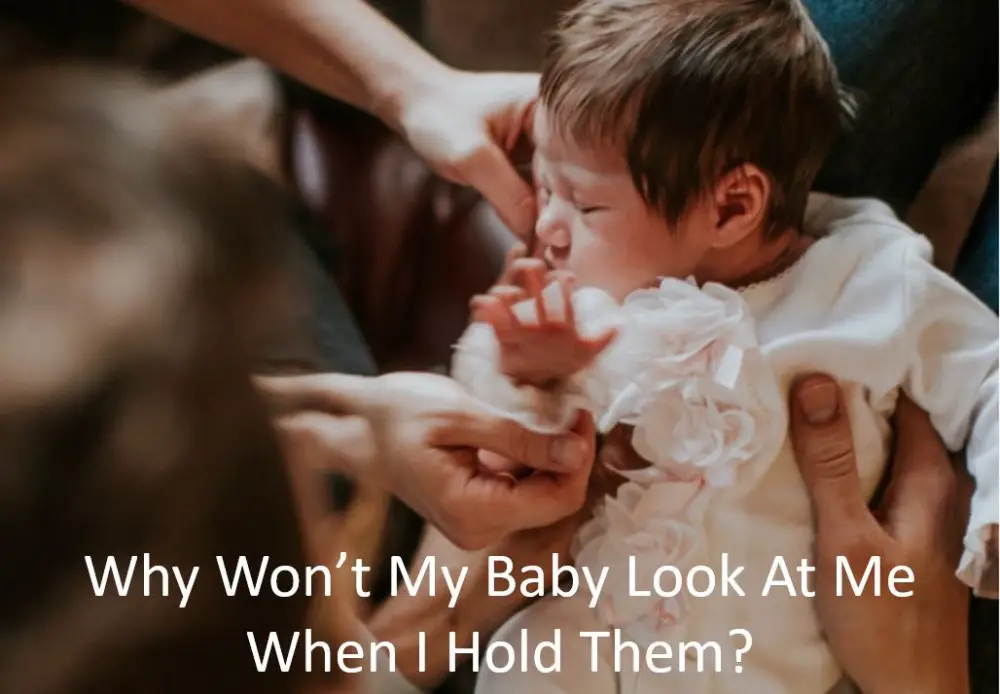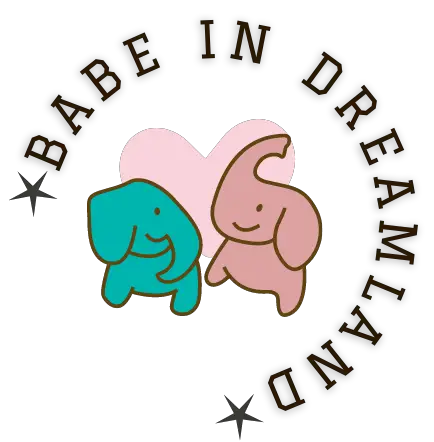Why Won’t My Baby Look At Me When I Hold Them? (5 Potential Reasons Explaining This Behaviour)

Typically, babies start direct eye contact with their parents and hold their gaze at around 6 weeks.
And once they start doing it intentionally – what an incredible moment for their parents that is! Especially when the eye gazing is paired with a gummy smile and cheerful cooing 🙂
During this intimate moment, an emotional connection is triggered instantly, which tightens the bond.
But hold on.
What if my baby is AVOIDING eye contact with me and TURNS AWAY from me when I hold her?
Is there something wrong with me or my baby?
Well, read on to find out.
The fact that your baby refuses to look at you when you hold them and shows no interest in eye contact is a potential red flag that needs to be addressed. Often it can be explained by your baby being overstimulated and needing a little quiet time. It may also mean something totally opposite – your baby is bored and needs to change activity or surroundings. However, it may also indicate a medical condition, such as misalignment between the eyes (strabismus), neurodevelopmental delay, or spectrum autism disorder.
Looking at Your Face Can Be Overstimulating
The human face provides high sensory stimulation for babies.
That’s because of the vast amount of sensory information that it offers. From the eyes expressing a spectrum of emotions, to the mouths producing different sounds.
Your baby may simply lack the capacity to process all the facial expressions they are exposed to when you hold them.
On top of that, maintaining eye contact at such a short distance can be quite an intense experience. And frankly – really tiring.
So, no staring contest at this age, I am afraid!
Therefore, your baby’s behaviour may indicate that they are overstimulated and need a break to process the information they have received. Hence they turn away from looking at you.
Also, to reassure you – it does not mean they are not interested in or rejecting you! Or that there is something wrong with you.
Quite the opposite – babies adore looking at their parents’ smiley faces and are particularly drawn to them.
So if they don’t look at you when you hold them. It’s nothing personal, indeed.
Bored By Looking At You All The Time
The thing with babies is that sometimes it is hard to guess what it is they want to tell us.
Sometimes, their behaviour may mean two totally opposite things. One time it may mean one thing, the other time something completely different.
Sigh…
As a matter of fact – one example of such behaviour is when your baby avoids looking at you when you hold her.
Because one time they may be overstimulated – the other time they might be bored. Especially if they show additional cues like; yawing, squirming or crying.
If that’s the case, perhaps a little change of scenery could sort out the issue and provide your baby with new stimulation they may crave.
Also, remember your baby is rather curious and totally into discovering the world around them.
Therefore, staring at you may just not be enough!
But, again, don’t take it personally.
Babies have a very short attention span, so they get bored relatively quickly.
All we can do is try to read their cues to understand their needs. And hopefully, using trial and error methods keeps them happy and thriving.
BABY PLAY – HOW TO PLAY WITH 0-3 MONTH OLD NEWBORN – BRAIN DEVELOPMENT ACTIVITIES
Eyesight Disorder
Another cause for your baby not looking at you when you hold her is a possible eyesight condition.
Because vision-related problems will directly impact cognitive development and decline – such as lack of eye contact.
Some eyesight conditions are more obvious to recognise and rule out than others.
From those easy to spot is strabismus, which is basically a misalignment between the eyes.
This means -when looking straight, from time to time, one or both eyes wander inwards, outwards, up or down.
Nevertheless, if your baby has strabismus, it may explain why they have trouble looking at you.
That’s because their eyes cannot focus on one object – your face.
But each eye is looking at a different object o direction. This means their brain receives two pictures, which may cause blurry vision, double vision or inability to see in 3-dimension.
Therefore, they may turn away from you and tilt their head to line up an object in their field of vision.
Eye misalignment commonly occurs in newborn babies due to weak eye muscles and lack of coordination with still-developing brains.
However, by 3 months, their eyes should straighten.
If that’s not the case, your baby may require medical treatment as the problem may not go away on its own.
What’s worse, if left untreated, it may lead to more severe vision problems.
Therefore, don’t hesitate to consult your baby’s paediatrician if the eye misalignment is still apparent by 3 months.
Neurodevelopmental Delay
Neurodevelopmental delay is another potential cause of lack of eye contact and lack of interest from your baby to gaze at you.
So if you ruled out vision-related conditions, then it is worth consulting a paediatric neurologist to screen for neurological disease.
As part of the screening, brain MRI, genetic analysis, or metabolic tests can be performed to determine the cause for the lack of eye contact and attainment of other developmental skills in your baby.
There are many reasons why a baby may suffer from neurodevelopmental delay. Among them are genetic disorders, chromosomal abnormalities, brain trauma, infections, poor nutrition and lack of stimulating care. All these may affect the brain and central nervous system development, resulting in neurodevelopmental delays.
Is My Child Developmentally Delayed? | How To Detect Developmental Delay
Early Sign Of Autism Spectrum Disorder (ASD)
It is also worth noting that when your baby avoids eye contact and any form of social interaction, it might be an early symptom of ASD.
Although ASD is difficult to diagnose in young babies as this is a brain development disorder. So there is no medical test, but mental disorder guidelines to aid diagnosis.
The screening for ASD is based on the observation of a child’s development (hitting milestones on time) and behaviour (how they are playing), and emotions (social interaction).
The avoidance of eye contact won’t be enough to confirm the ASD diagnosis in your baby and you should wait until they are at a certain age to allow the assessment to be more accurate.
We all know that babies develop at their own pace, so if your baby is not hitting their milestones at the same time as their peers, that alone is not a reason to suspect autism.
Nevertheless, it is possible to diagnose babies as early as 18 months old with ASD and provide them with the help they need to allow them to reach their full potential.
Final Few Lines
There you go.
5 potential reasons your baby may refuse to look at you when you hold her.
Some of them can be easily fixed, whilst those related to medical disorders require specialist advice and treatment.
Nevertheless, if your baby is not looking at you it is certainly not a sign of rejection, so please don’t take it personally.
